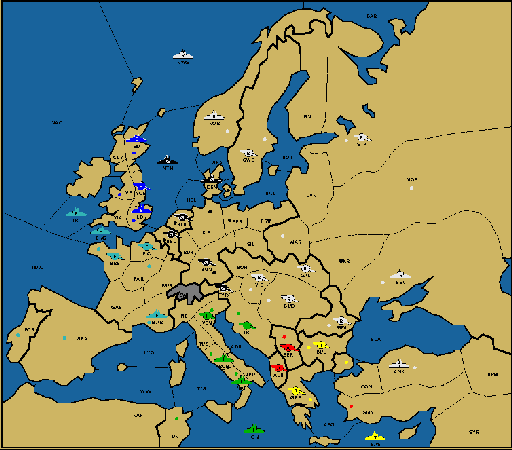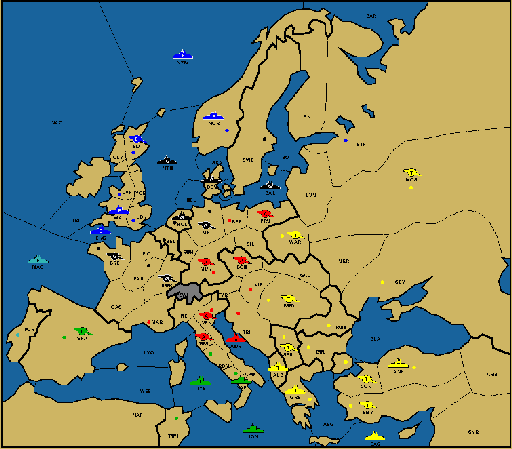 |
|---|


ELS arises when one nation grows disproportionately, usually at the beginning of the game, causing the other players to co-operate against the leader to preserve the balance of power. Simply put, if you get too big too fast, the other players will get worried about you and will take steps to cut you down to size.
A clear example of ELS happened to me recently in the game jiverne on USEF. As Russia, I negotiated early alliances with Turkey and Germany, allowing me to control Vienna, Budapest, and Rumania in the south, and Norway and Sweden in the north by 1903. Despite my own success against Austria, Turkey was making only slow progress. Elsewhere, I was getting ready to land an army in northern England. In short, things looked pretty good.
With a seemingly benevolent Italy, I felt the time was right to derail the juggernaut and make a move on Turkey and establish for myself a dominant position in the southeast. In Fall 1903, I took Ankara from Turkey, giving me ten Supply Centers. The other powers were considerably smaller:
 |
|---|
Now I grant you, my attack on Turkey wasn't the most effective stab you'll ever see, but I was counting on being able to keep Austria, Italy and Turkey from co-ordinating an effective defense. As it turns out I had completely misjudged the situation. My "friends" Germany and Italy stepped in to organize a five-power anti-Russian alliance. France, who had no units in direct contact with mine, contributed by refusing to attack Germany or Italy. I was quickly knocked down to 7 centers the next year and my hopes of winning were essentially dashed. The moral of the story so far is this: don't become the clearly dominant power unless you are able to preserve your position through cunning diplomacy, or you are large enough to make the dash for victory. Unfortunately, I was neither.
The next question is: when someone else in your game falls prey to ELS, what is the best way to take advantage? This question is answered by an examination of the behavior of France in the rest of game jiverne.
When the others decided to attack me (Russia), France made peace with Germany and Italy and moved to take out the weakest and most diplomatically isolated of his neighbors: England. After this goal was accomplished, in 1906, France at 10 centers was in fact stronger than anyone else. Indeed, by this time Italy and I had pegged France as the real threat to win the game and were trying to persuade Germany to defend his western front before France attacked him. Germany, however, was completely under France's spell and continued to attack me in north and central Europe, despite not making any gains for some time. France's persuasive diplomacy allowed him to set Germany up for a massive stab in 1907, after which he tried to sprint to victory. However, Italy and I were able to co-ordinate a stalemate line controlling 18 centers, and the game finished in a three-way draw.
In essence, then, France forged an alliance with Germany based on the need to control Russian expansion, and used skilful diplomacy to maintain the alliance after the Russian threat had dissipated. Germany was so distracted by Russia that he failed to realize that his seemingly trustworthy ally was setting him up for a fall. France's clever manipulation of Germany almost garnered him a victory.
This example shows that when one power suffers from ELS, it creates an opportunity for other powers, particularly those on the other side of the board, to increase in size while the rest are occupied with halting the leading power's expansion. It is frequently advantageous to deliberately curb one's own growth while another power grows large, in order to reap benefits when international attention is diverted from you.
Two other interesting examples of ELS occurred in the game fly on the USEF judge. As England in this game I took part with Germany and Italy in an early alliance against France while Turkey and Austria waged war on Russia. In Fall 1903, just as France was being rendered helpless, Germany stabbed me, taking the North Sea. Germany was clearly in position to take Edinburgh and Belgium, and would have had ten centers by the end of 1904. Turkey (and, to a lesser extent, I) convinced Austria to attack Germany. Germany had grown too quickly for the comfort of the southeastern powers and had fallen prey to ELS.
 |
|---|
Until Fall 1906, Austria and Turkey battled Germany and Italy while I -- with France keeping Italy out of the Atlantic and with German attention distracted -- managed to get back on my feet. The tide was clearly turning in favor of the Austro-Turkish alliance when Turkey stabbed Austria to grow to eleven centers in 1906, four more than any other power. Everyone now saw the belligerent Turk as the major threat, and devoted most of their resources toward containing him. Even though Turkey was pretty much halted in 1907, the fear of a Turkish victory and the central powers' inability to push him back were such strong motivating forces that I was continually urged to attack Turkey from my positions in northern Russia. (Also involved was the Italian desire for me to abandon the seas around western England, but I think the main push was anti-Turkish.)
 |
|---|
With the exception of one Italian fleet, Germany and I were isolated in the northwest. Using the anti-Turkish fever to my advantage, I deceived Germany by falsely agreeing to some anti-Turkish maneuvers. The resulting stab left Germany in a very much weaker position, but still Italy and Austria were more concerned with Turkey. Turkey and I were roughly equal in power and actively working together from 1910 to 1914, dividing the attention of the central powers. In 1915, I stabbed Turkey and was lucky enough to pull out the victory.
In this game two powers (Germany and then Turkey) fell victim to ELS, indicating that perhaps the "early" in early leader syndrome is a misnomer. At any point in the game, if one power is clearly dominant over the rest, the pressure to collaborate against him will be strong. This is obviously particularly true when the leading power is within a few Centers of winning; by this time the leader can sometimes force a victory, especially if co-ordination by the smaller powers is less than perfect.
To summarize, I offer the following advice for your consideration.

|
Derek McLachlin University of Western Ontario (dmclachl@julian.uwo.ca) |
If you wish to e-mail feedback on this article to the author, click on the letter above. If that does not work, feel free to use the "Dear DP..." mail interface.

